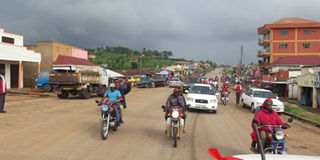Town councils crippling operations of sub-counties, say officials

New. Kagarama Town Council was carved out of Ihunga Sub-county in Ntungamo District. PHOTO BY PEREZ RUMANZI
What you need to know:
- Complaint. The sub-county leaders say new town councils affect their revenue collections and service delivery.
NTUNGAMO/Mbarara.
Government’s move to gazette many of the trading centres as town councils in an effort to promote urbanisation is crippling operations of sub-counties, officials have said.
Most of the trading centres evolved near sub-county headquarters, and when they are elevated to town councils, the headquarters are shifted to new location. Town councils take up the buildings there after because two local governments can’t operate in the same place.
Though leaders of various sub-counties acknowledge that creation of town councils comes with several development benefits, they say it affects their revenue collections and service delivery as they struggle to re-establish themselves in new areas.
Rubaare, Kitwe, Rwashamaire, Kagarama, Nyamunuka, Kafunjo-Mirama, Rwoho, Rwamabondo, Nyamukana and Rwentobo-Rwahi trading centres in Ntungamo District have been elevated to town councils over the last seven years but their mother sub-counties have since suffered drawback in operations.
Buyanja and Kebisonoi town councils in Rukungiri District took up offices of the mother Buyanja and Kebisoni sub-counties respectively.
Kambuga and Kihihi sub-counties in Kanungu ceded the offices to Kihihi and Kambuga town councils and had to re-establish themselves elsewhere albeit with a lot of difficulty.
Four new town councils of Bwizibwera, Rubindi, Nyeihanga and Mwizi have been created in Mbarara District and when they are operationalised, probably next financial year, the sub-counties will be moved to new areas.
The LC3 chairman for Rubaare Sub-county, Mr Jackson Tugume Kamugyene, said they have been renting office space since 2010 when Rubaare Town Council was created.
“We have failed to get money to complete our headquarters. What happened is that the town council was given start up fund yet it’s us who were to shift, it was unfair. We tried to push for the money but the Ministry of Local Government told us we can’t get it,” says Mr Kamugyene.
The Bwongyera Sub-county chairperson, Mr James Tinkamanyire, echoes the same.
Bwongyera gave birth to Nyamunuka Town Council and shifted its offices to Rwanda Parish headquarters. “We are the ones who gave a minute for forming Nyamunuka Town Council. The town council was given start up fund; we were not given any money. The law is unfair I think the Ministry of Local Government and Finance need to revise it. At least where the sub-county is giving away its headquarters, it should receive the startup fund,” says Mr Tinkamanyire.
The Kihihi Sub-county chairperson, Mr Nelson Twinamatsiko, says it was inconveniencing to operate office from Kihihi Town Council for 10 years when the people they serve are outside the town.
“We were supposed to go to Nyanga but there was no money to construct a new building or rent offices. We had to find space in town to operate,” he says.
The Ntungamo Chief Administrative Officer, Mr Kweyamba Ruhemba, says sub-counties should not be failing to re-establish themselves because they have the necessary resources.
“It is the sub-counties that must first give a minute to the district council that they want to give away these towns and they are well aware of the implications. They are expected to build new offices,” says Mr Ruhemba.
The main towns in these communities provide major revenue sources to run sub-countries but when they become autonomous sub-counties, they struggle to provide social services.
The LC3 chairman for Rwanyamahembe, Mr Peterson Kakuru, says they are currently running a budget of Shs330 million.
Mr Kakuru says they only get Shs20 million from central government every financial year and collect the rest of money from local revenue sources. Of this 18 per cent of the local revenue collections go to Uganda Revenue Authority as VAT and 35 per cent is remitted to the district.
With the creation of Bwizibwera Town Council revenue for Rwanyamahembe Sub-county will considerably reduce. The two daily matooke markets where they have been collecting at least Shs16 million every month will fall in the town council.
He, however, says that much as creation of town councils weakens sub-counties in terms of revenue collection it facilitates employment and improvement in services.


